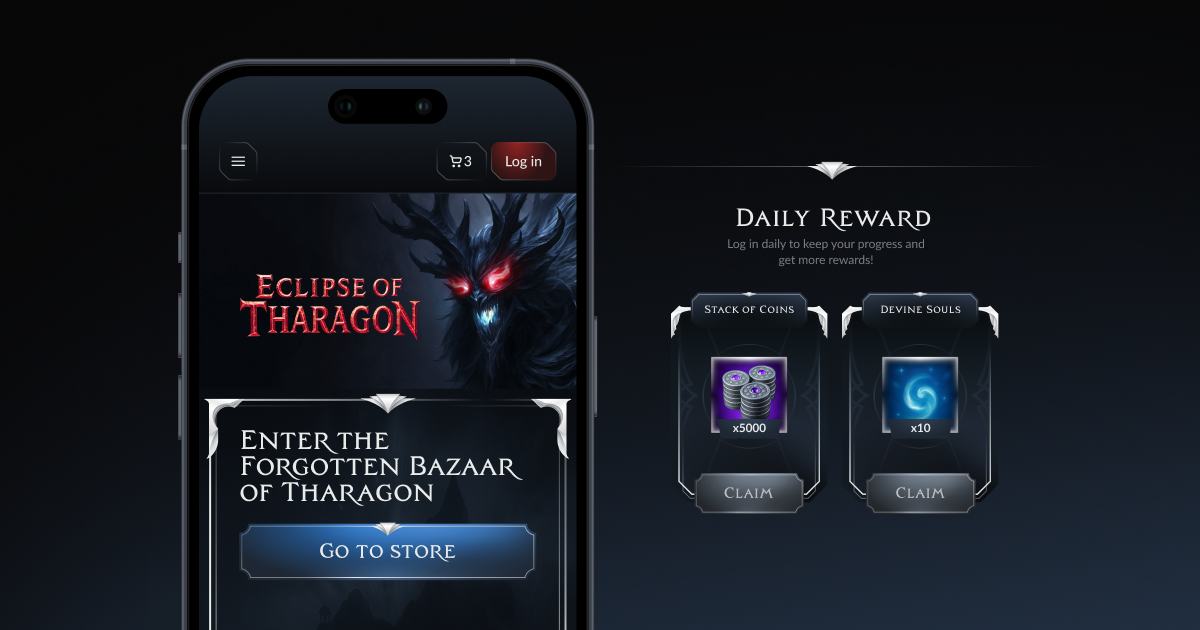Direct-to-consumer sales (D2C) are the new standard in game monetization
Let's explore together with Xsolla what direct sales are, how it happened that the mobile gaming market has embraced them now, and why they require adaptation from both developers and users.
This material was prepared by Pavel Savkin, Product Director (Monetization) at Xsolla.
Pavel Savkin
What are direct sales?
Direct sales (direct-to-consumer or D2C) is a model where developers interact directly with players, bypassing intermediaries like the App Store or Google Play.
When we say "direct sales," we mean proprietary communication channels, full control over the user experience, and flexibility in monetization. Therefore, D2C as a phenomenon is inherently linked to web stores.
A web store is an in-game store taken outside. Essentially, it's an IAP showcase where the player can make purchases directly from the game's developer. Generally, this is more advantageous because the web store prices do not include the Apple and Google commissions.
Example of a web store in STAR TREK TIMELINES
What’s wrong with the traditional sales model?
To understand why we're talking about direct sales, we need to discuss what the "traditional model" of sales is.
Not so long ago, this model in the mobile market boiled down to the following:
- find a successful game mechanic;
- purchase traffic at a reasonable price;
- scale through IAP monetization;
- collect profits.
Nowadays, it no longer works. We won't delve deeply into the reasons. In short, the platforms themselves are to blame, having abandoned helping users discover new content in favor of supporting obvious market leaders.
This has resulted in the following situation:
- the cost of user acquisition has risen to extremely high levels and continues to grow;
- the effectiveness of advertising campaigns has dropped due to tracking restrictions (ATT, GDPR);
- visibility and discoverability on the two main mobile platforms — App Store and Google Play — have worsened;
- it has become nearly impossible for new games to pay off regardless of their quality.
Surviving under such conditions has become extremely difficult for mobile game developers. Additionally, the situation has been worsened by restrictions on using additional monetization channels.
For instance, there were prohibitions against indicating alternative payment methods within the app and using push notifications to inform about special offers outside the platform.
That means, after spending on acquiring audiences on the App Store and Google Play and not getting revenue from them, developers were denied the right to try to generate income using external tools.
Ultimately, with one hand, studios stopped earning due to the detrimental policies of key app stores, while with the other, these same stores prohibited studios from seeking solutions to the problem, threatening with blocking.
There was nothing to be done about it. This is, by the way, why many developers started successfully transitioning to web and PC, where they gained the ability to:
- manage sales channels and user data;
- set prices, offers, and payment methods independently;
- decide when and how to bring players back.
But the situation began to change rapidly.
Heroes Wars — a clear example of a title that gained a separate web version
How did developers get a chance to break away from the traditional model?
This happened thanks to the attention to monopoly issues from government regulators around the world.
In the USA, the court obliged Apple to allow developers to inform users about external payment options.
In the European Union, per the Digital Markets Act (DMA), Apple and Google were required to open their ecosystems to third-party stores and payments.
In South Korea, a law was passed prohibiting monopoly on payment systems in stores and later strengthened it by requiring platforms to be more open.
Similar measures may also be introduced in Japan, India, Brazil, Australia, and even China, where local studios are also striving for greater independence from platforms.
As a result of all these shifts, while App Store and Google Play themselves are unlikely to change, developers long tied to their ecosystems now have the opportunity to effectively monetize their products — including now legally placing a link to their web stores inside the game.
This is a global shift, comparable in scale to the advent of free-to-play. As then, those who adapt themselves and their audience first will benefit the most.
The Fortnite store, where Epic Games placed links to external payment systems, and the subsequent years-long legal battle became a catalyst for the move to D2C
What does adaptation have to do with it; what changes with direct sales?
The switch to direct payments is a profound cultural and behavioral shift.
For years, players have become accustomed to one pattern: all purchases are made inside the game, with two clicks, without unnecessary transitions. The platform trained them to expect seamlessness and control.
Direct payments through web stores, the appearance of links and external pages, offer a new user experience that provokes many reactions:
- caution: "Is this safe?";
- doubt: "Will I definitely get my purchase in the game?";
- laziness: "Why should I go to a browser and take extra steps?";
- distrust: "Could this be a workaround or scam?".
To minimize the effect of these doubts, the audience must be prepared in advance.
We'll discuss in detail how exactly to do this next time, but for now, it's worth noting that direct sales are not merely a payment method. They are the foundation for the growth of a new model. Through them, teams can build a strong, manageable connection with their audience.
Those who are already preparing their audience for the global change in user experience by creating new offers and educational scenarios will gain a competitive edge. They will be able to experiment faster, gather more data, reduce commissions, and strengthen connections with users.




